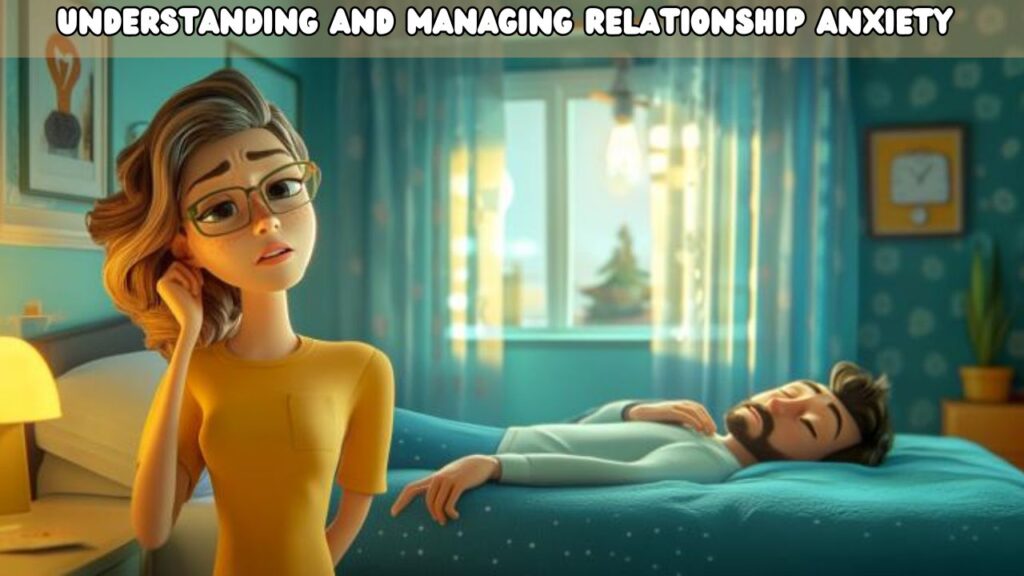Relationship anxiety refers to the persistent worry and fear about the health and future of a romantic relationship. This anxiety can significantly impact an individual’s thoughts, emotions, and behaviors, often leading to strain within the relationship. Understanding what relationship anxiety entails is crucial for addressing and managing it effectively.
Definition and Overview
Relationship anxiety manifests as a constant state of unease and apprehension about the stability and longevity of a romantic partnership. This type of anxiety can arise in any relationship, regardless of its duration or the partners involved. The anxiety stems from deep-seated fears and insecurities, often related to personal experiences and attachment styles. The symptoms of relationship anxiety can vary widely but often include:
- Constant Worry: Individuals with relationship anxiety may frequently worry about their partner’s feelings and the future of the relationship. This worry can be all-consuming, affecting daily functioning and overall well-being.
- Overanalyzing: There is a tendency to overinterpret and scrutinize every action, word, or gesture from the partner, often looking for hidden meanings or signs of trouble. This can lead to miscommunications and unnecessary conflicts.
- Seeking Reassurance: A common behavior is the continuous need for validation and reassurance from the partner. This can manifest as asking repetitive questions or seeking constant confirmation of the partner’s love and commitment.
Several factors can contribute to the development of relationship anxiety:
- Past Trauma: Experiences of betrayal, abandonment, or neglect in previous relationships can leave lasting emotional scars, making individuals more prone to anxiety in current relationships.
- Insecurity: Personal insecurities, such as low self-esteem or body image issues, can make individuals doubt their worthiness of love and affection, leading to heightened anxiety.
- Attachment Styles: Early attachment experiences with caregivers significantly influence how one views and manages relationships in adulthood. Insecure attachment styles, in particular, are linked to higher levels of relationship anxiety.
Relationship anxiety can have profound effects on both individuals and the relationship as a whole:
- Communication Issues: Anxiety can lead to poor communication, as individuals might struggle to express their fears or overreact to minor issues, leading to misunderstandings.
- Emotional Exhaustion: Constant worrying and seeking reassurance can be emotionally draining for both partners, leading to burnout and frustration.
- Trust Issues: Persistent anxiety can erode trust. Doubting a partner’s intentions or fidelity can create a cycle of suspicion and defensive behaviors, undermining the relationship’s foundation.
Psychological Roots
The psychological underpinnings of relationship anxiety are often deep-seated and complex, rooted in early life experiences and individual personality traits.
Attachment styles developed in childhood can significantly influence relationship anxiety in adulthood:
- Secure Attachment: Individuals with a secure attachment style are generally less prone to relationship anxiety. They have a balanced view of intimacy and independence, and they tend to trust their partner’s intentions.
- Anxious Attachment: Those with an anxious attachment style tend to crave closeness but fear abandonment. This fear can make them more susceptible to relationship anxiety, as they constantly worry about their partner’s commitment.
- Avoidant Attachment: Individuals with avoidant attachment styles may struggle with intimacy and often distance themselves emotionally. Although they may appear detached, they can experience underlying anxiety about being too close or vulnerable.
Previous relationship experiences and traumas play a crucial role in shaping current relationship anxiety:
- Betrayal and Infidelity: Past experiences of betrayal or infidelity can leave deep scars, causing individuals to be hypervigilant and anxious in future relationships.
- Abuse and Neglect: Emotional or physical abuse, neglect, or other traumatic experiences in past relationships can contribute to chronic anxiety about being hurt again.
- Breakups and Divorce: The end of significant relationships, especially if unexpected or traumatic, can lead to lasting fears about relationship stability.
Certain personality traits can predispose individuals to relationship anxiety:
- Perfectionism: Perfectionists may have unrealistic expectations of themselves and their partners, leading to constant dissatisfaction and anxiety.
- Neuroticism: High levels of neuroticism, characterized by emotional instability and negativity, can contribute to heightened relationship anxiety.
- Dependency: Highly dependent individuals might fear losing their partner excessively, resulting in clinginess and anxiety.
Recognizing the Signs
Being able to identify the signs of relationship anxiety early on can help manage it before it escalates. These signs can be emotional, behavioral, and cognitive. Relationship anxiety can trigger a range of emotional responses:
- Fear: Persistent fear of abandonment or being alone is a common emotional response. This fear can be irrational but feels very real to the person experiencing it.
- Insecurity: Individuals with relationship anxiety often feel inadequate or unworthy of love and affection. This insecurity can undermine their confidence and affect their interactions with their partner.
- Constant Worry: Continuous worry about the relationship’s future and the partner’s feelings can dominate a person’s thoughts, leading to chronic stress and emotional exhaustion.
Behavioral patterns that indicate relationship anxiety include:
- Reassurance Seeking: Frequently asking the partner for validation and assurance of their love and commitment is a common behavior. This can range from subtle inquiries to outright demands for affirmation.
- Overanalyzing Behavior: Scrutinizing every action, word, or gesture from the partner for hidden meanings can lead to unnecessary conflict and strain in the relationship.
- Clinginess: Excessive need for closeness and fear of being apart from the partner can manifest as clinginess. This behavior can suffocate the partner and create tension.
Cognitive signs of relationship anxiety are often related to negative thought patterns:
- Negative Thinking: Recurring negative thoughts about the relationship and the partner’s intentions are typical. These thoughts can be baseless but feel overwhelming.
- Doubt: Constant doubts about the partner’s love, loyalty, and commitment can plague someone with relationship anxiety, even in the absence of any real evidence.
- Catastrophizing: Imagining worst-case scenarios and expecting the relationship to fail is a common cognitive distortion associated with relationship anxiety. This mindset can prevent individuals from enjoying their relationship and fostering a positive connection.
Understanding these aspects of relationship anxiety is the first step toward managing it effectively. By recognizing the symptoms, identifying the psychological roots, and acknowledging the signs, individuals can take proactive steps to address their anxiety and foster healthier, more stable relationships.
Identifying Triggers of Relationship Anxiety

Understanding the specific triggers of relationship anxiety is crucial for developing effective strategies to manage it. Relationship anxiety can stem from various sources, including personal insecurities, relationship dynamics, and external influences. Recognizing these triggers can help individuals address the root causes of their anxiety and build healthier relationships.
Personal Insecurities
Personal insecurities often serve as a significant trigger for relationship anxiety. These insecurities can arise from various aspects of an individual’s life and self-perception. Body image issues can deeply affect one’s confidence and contribute to relationship anxiety.
- Self-Perception: Individuals who are dissatisfied with their appearance may feel unworthy of love and affection. This can lead to constant worries about their partner’s attraction to them.
- Comparisons: Comparing oneself to others, especially in a world dominated by social media, can exacerbate body image issues and fuel anxiety about being less attractive or desirable.
- Reassurance Seeking: People with body image insecurities may frequently seek reassurance from their partners about their looks, which can strain the relationship.
The fear of rejection is a powerful force that can drive relationship anxiety.
- Past Experiences: Previous experiences of rejection, whether in childhood or past relationships, can create a lasting fear of being rejected again.
- Overcompensation: This fear might lead individuals to overcompensate by being overly attentive or clingy, hoping to prevent their partner from leaving them.
- Emotional Walls: Conversely, some may build emotional walls to protect themselves from potential rejection, which can hinder intimacy and connection.
Low self-worth or self-esteem can significantly contribute to relationship anxiety.
- Doubting Worthiness: Individuals with low self-esteem may constantly doubt their worthiness of love and affection, leading to anxiety about their partner’s commitment.
- Negative Self-Talk: Engaging in negative self-talk can perpetuate feelings of inadequacy and increase anxiety within the relationship.
- Dependency: Low self-worth can result in dependency on the partner for validation and self-esteem, placing undue pressure on the relationship.
Relationship Dynamics
The dynamics within the relationship itself can be significant triggers for anxiety. Understanding these dynamics can help in addressing relationship anxiety more effectively. Poor communication can exacerbate relationship anxiety and create a cycle of misunderstandings.
- Lack of Expression: Difficulty in expressing feelings and concerns can lead to bottled-up emotions and increased anxiety.
- Misinterpretation: Misinterpreting the partner’s words or actions due to anxiety can result in unnecessary conflicts.
- Avoidance: Avoiding difficult conversations out of fear of conflict can prevent resolution of underlying issues, perpetuating anxiety.
The history of conflicts in a relationship can trigger ongoing anxiety.
- Unresolved Issues: Unresolved conflicts from the past can resurface, causing continuous worry about recurring problems.
- Fear of Arguments: Anxiety about potential arguments can lead to walking on eggshells around the partner, inhibiting open communication.
- Pattern Recognition: Recognizing patterns of conflict can lead to anticipatory anxiety, where one constantly worries about future arguments.
Power imbalances within the relationship can create a fertile ground for anxiety.
- Control Issues: One partner having more control over decisions can make the other feel powerless and anxious.
- Dependence: High dependence on the partner for emotional or financial support can create anxiety about losing that support.
- Manipulation: Manipulative behaviors can exacerbate feelings of insecurity and anxiety in the relationship.
External Influences
External factors outside the relationship can also significantly contribute to relationship anxiety. These influences can come from societal, familial, or situational sources. Societal norms and expectations about relationships can create pressure and anxiety.
- Cultural Norms: Societal pressure to conform to certain relationship milestones (e.g., marriage, children) can cause anxiety if one feels they are not meeting these expectations.
- Social Media: The portrayal of idealized relationships on social media can lead to comparisons and feelings of inadequacy about one’s own relationship.
- Peer Pressure: Pressure from friends or social circles to maintain a certain image of a perfect relationship can contribute to anxiety.
Family opinions and involvement in one’s relationship can be a significant source of anxiety.
- Parental Approval: Seeking approval from parents or family members can cause stress, especially if their views conflict with one’s own relationship choices.
- Family Dynamics: Family dynamics, such as expectations for cultural or religious conformity, can create additional pressure and anxiety.
- Interference: Excessive involvement or interference from family members in the relationship can lead to tension and anxiety.
Various life stressors can impact an individual’s emotional state and contribute to relationship anxiety.
- Work Pressure: High levels of stress at work can spill over into the relationship, making it harder to manage anxiety.
- Financial Issues: Financial instability or disagreements about money can create significant stress and anxiety within the relationship.
- Health Concerns: Chronic health issues, whether one’s own or a partner’s, can add an extra layer of stress and anxiety to the relationship.
Strategies to Manage Relationship Anxiety

Managing relationship anxiety requires a proactive approach that focuses on improving communication, building self-esteem, and seeking professional help when necessary. By addressing these areas, individuals can reduce anxiety and foster healthier, more fulfilling relationships.
Open Communication
Effective communication is crucial in managing relationship anxiety. Open, honest dialogue helps partners understand each other’s feelings, needs, and concerns, fostering a stronger, more trusting relationship. Being truthful about your feelings and fears is the cornerstone of open communication.
- Expressing Emotions: Share your anxieties and insecurities with your partner. Honest expression helps your partner understand what you’re going through and provides an opportunity for mutual support.
- Avoiding Assumptions: Don’t assume your partner knows how you feel. Clear and direct communication prevents misunderstandings and reduces anxiety.
- Vulnerability: Allow yourself to be vulnerable. Opening up about your fears and worries can be challenging, but it builds trust and deepens emotional intimacy.
Active listening ensures that both partners feel heard and understood.
- Full Attention: Give your partner your full attention during conversations. Avoid distractions like phones or TV to show that you value their feelings.
- Reflective Responses: Respond by reflecting back what you’ve heard. For example, say, “It sounds like you’re feeling…” This technique ensures you understand their perspective and shows empathy.
- Non-Judgmental Attitude: Listen without judgment or immediate advice-giving. Sometimes, simply being heard and understood is more valuable than solutions.
Scheduling regular times to discuss your relationship can help prevent anxiety from building up.
- Scheduled Conversations: Set aside specific times to talk about your relationship. Regular check-ins create a safe space for discussing worries and addressing issues before they escalate.
- Open-Ended Questions: Use open-ended questions to facilitate deeper conversations. Questions like, “How have you been feeling about our relationship lately?” encourage meaningful dialogue.
- Positivity and Gratitude: Balance discussions of concerns with expressions of appreciation and gratitude. Highlighting positive aspects of the relationship can counteract anxiety and reinforce your bond.
Building Self-Esteem
Improving self-esteem can significantly reduce relationship anxiety. When you feel good about yourself, you’re less likely to doubt your partner’s love and commitment.
Engaging in self-care activities boosts self-worth and overall well-being.
- Physical Health: Prioritize physical health through regular exercise, a balanced diet, and adequate sleep. Physical well-being positively impacts mental health and self-esteem.
- Hobbies and Interests: Pursue hobbies and interests that make you feel fulfilled and happy. Engaging in activities you enjoy builds confidence and provides a sense of accomplishment.
- Relaxation Techniques: Practice relaxation techniques such as meditation, yoga, or deep-breathing exercises to manage stress and enhance self-esteem.
Using positive affirmations helps reframe negative self-talk and reinforce self-worth.
- Daily Affirmations: Start each day with positive affirmations like, “I am worthy of love and respect,” or “I am confident and capable.” Repeating these statements reinforces a positive self-image.
- Visual Reminders: Place visual reminders of affirmations around your living space, such as on mirrors or your desk. These reminders keep positive thoughts in the forefront of your mind.
- Affirmation Journal: Keep a journal of positive affirmations and reflect on them regularly. Writing and reviewing affirmations can deepen their impact.
Focusing on personal growth fosters independence and self-confidence.
- Setting Goals: Set and pursue personal goals that are independent of your relationship. Achieving personal milestones boosts self-esteem and provides a sense of accomplishment.
- Skill Development: Learn new skills or pursue further education. Expanding your knowledge and abilities enhances self-confidence and opens up new opportunities.
- Self-Reflection: Regularly reflect on your personal growth and achievements. Acknowledging your progress reinforces a positive self-image and reduces reliance on external validation.
Professional Help
Sometimes, managing relationship anxiety requires professional intervention. Therapists, counselors, and support groups can provide valuable tools and perspectives. Individual or couples therapy can offer a safe space to explore and address relationship anxiety.
- Individual Therapy: Working with a therapist one-on-one can help you understand the root causes of your anxiety and develop coping strategies. Therapists can offer tailored techniques to manage anxiety effectively.
- Couples Therapy: Couples therapy provides a neutral environment to discuss relationship concerns and improve communication. A therapist can help both partners understand each other’s perspectives and work towards mutual solutions.
- Cognitive-Behavioral Therapy (CBT): CBT is particularly effective for anxiety. It focuses on identifying and challenging negative thought patterns and replacing them with healthier ones.
Joining a support group allows you to connect with others facing similar issues, providing mutual support and understanding.
- Anxiety Support Groups: These groups focus on managing anxiety and offer a community of individuals who understand your struggles. Sharing experiences and coping strategies can be incredibly comforting and empowering.
- Relationship Support Groups: Groups that focus on relationship issues can provide insights and advice on managing relationship anxiety. Hearing from others in similar situations can offer new perspectives and solutions.
- Online Communities: Online support groups and forums offer flexible, accessible support. Engaging with an online community can provide continuous encouragement and resources.
Utilizing self-help resources can complement therapy and support group participation.
- Books and Articles: Reading books and articles on relationship anxiety and self-esteem can provide valuable insights and strategies. Look for works by reputable authors and therapists.
- Online Courses: Many platforms offer online courses on managing anxiety and improving relationships. These courses can provide structured guidance and practical tools.
- Podcasts and Webinars: Listening to podcasts or attending webinars on mental health and relationships can offer ongoing support and education. Experts often share practical advice and personal experiences that can be very helpful.
Creating a Healthy Relationship Environment

Establishing a healthy relationship environment is crucial for managing relationship anxiety and fostering a fulfilling partnership. This involves setting clear boundaries, prioritizing quality time together, and practicing mindfulness to maintain emotional balance and connection.
Establishing Boundaries
Healthy boundaries are essential for any relationship. They help define each partner’s needs and expectations, ensuring mutual respect and understanding. Boundaries should be established through mutual agreement, where both partners actively participate in the discussion.
- Open Dialogue: Initiate conversations about boundaries with your partner. Discuss what each of you needs and expects in the relationship to feel secure and respected.
- Compromise: Be willing to compromise and find a middle ground that satisfies both partners. Effective boundaries should reflect both partners’ needs and preferences.
- Clarity: Clearly define what each boundary entails. Ensure both partners understand and agree to the terms, minimizing misunderstandings and conflicts.
Respecting each other’s boundaries is vital for maintaining trust and reducing anxiety.
- Consistent Adherence: Consistently respect the established boundaries. Ignoring or violating boundaries can erode trust and increase anxiety.
- Feedback and Adjustment: Encourage feedback from your partner if they feel a boundary is being crossed. Be open to adjusting boundaries as needed to maintain respect and understanding.
- Supportive Environment: Create an environment where both partners feel comfortable expressing their boundaries without fear of judgment or retaliation.
Boundaries should be flexible enough to adapt to changing circumstances and evolving relationship dynamics.
- Reassessment: Regularly reassess boundaries to ensure they still meet both partners’ needs. Life changes, personal growth, and relationship dynamics can necessitate boundary adjustments.
- Open-Mindedness: Approach boundary discussions with an open mind. Be willing to consider your partner’s perspective and adjust boundaries to accommodate both partners’ evolving needs.
- Growth and Change: Recognize that boundaries can change over time. Being flexible allows the relationship to grow and adapt, fostering a healthier, more resilient partnership.
Prioritizing Quality Time
Spending quality time together is crucial for strengthening your relationship and reducing anxiety. It helps maintain a strong emotional connection and provides opportunities for positive interactions. Engaging in activities that both partners enjoy can enhance bonding and create lasting memories.
- Hobbies and Interests: Find hobbies or interests that you both enjoy and make time to engage in them together. Shared activities foster connection and provide fun, low-stress ways to spend time together.
- New Experiences: Try new activities or experiences together. Exploring new interests can keep the relationship exciting and provide opportunities for growth and learning.
- Daily Rituals: Incorporate daily rituals, such as morning coffee or evening walks, into your routine. These small, consistent activities can strengthen your bond and provide regular moments of connection.
Regular date nights can help maintain the romantic and intimate aspects of your relationship.
- Scheduling: Schedule regular date nights and prioritize them in your calendar. Treat these nights as important commitments to your relationship.
- Variety: Mix up your date night activities to keep things interesting. Alternate between favorite activities and trying new experiences to keep the excitement alive.
- Focus: During date nights, focus on each other without distractions. Put away phones and other distractions to fully engage with your partner and enjoy each other’s company.
Planning trips or outings can create new memories and strengthen your bond.
- Short Getaways: Plan short getaways or weekend trips to escape the daily routine and explore new places together. These trips can provide a refreshing break and create lasting memories.
- Local Adventures: Explore local attractions, parks, or events together. Local outings can be just as exciting as long trips and are easier to plan regularly.
- Spontaneity: Embrace spontaneity by occasionally planning surprise outings or trips. Unexpected adventures can add excitement and joy to your relationship.
Practicing Mindfulness
Mindfulness practices can help manage relationship anxiety and promote a healthier, more balanced emotional state. Incorporating meditation into your routine can help reduce stress and increase emotional stability.
- Regular Practice: Establish a regular meditation practice. Even a few minutes of daily meditation can help calm the mind and reduce anxiety.
- Guided Meditations: Use guided meditations specifically focused on relationships and emotional well-being. Many apps and online resources offer tailored meditations to support relationship health.
- Partner Meditation: Practice meditation together as a couple. Shared mindfulness practices can deepen your emotional connection and provide mutual support.
Breathing exercises can help manage immediate stress and anxiety, promoting a sense of calm.
- Deep Breathing: Practice deep breathing exercises to calm the nervous system. Inhale deeply through the nose, hold for a few seconds, and exhale slowly through the mouth.
- Box Breathing: Try box breathing, a technique where you inhale for four counts, hold for four counts, exhale for four counts, and hold again for four counts. This method can quickly reduce anxiety.
- Regular Breaks: Take regular breaks throughout the day to practice breathing exercises. Consistent practice can help maintain a calm and centered state of mind.
Keeping a gratitude journal can shift your focus to the positive aspects of your relationship.
- Daily Entries: Write daily entries in your gratitude journal, noting specific things you appreciate about your partner and your relationship. This practice can help cultivate a positive outlook and reduce anxiety.
- Shared Gratitude: Share your gratitude entries with your partner. Expressing appreciation openly can strengthen your bond and foster a more positive relationship environment.
- Reflective Practice: Reflect on your gratitude entries regularly. Revisiting positive moments and expressions of appreciation can reinforce a positive mindset and reduce stress.
Conclusion

Managing relationship anxiety requires a multifaceted approach that includes open communication, building self-esteem, and creating a healthy relationship environment. By understanding and addressing personal insecurities, relationship dynamics, and external influences, individuals can take proactive steps to mitigate anxiety. Establishing clear boundaries, prioritizing quality time together, and practicing mindfulness are essential strategies that foster mutual respect, emotional connection, and overall well-being. Seeking professional help, such as therapy and support groups, can provide additional support and tools for managing anxiety. By implementing these strategies, you can create a more secure, fulfilling, and resilient relationship, where both partners feel valued, understood, and supported. Remember, it is a journey that requires patience, self-awareness, and ongoing effort, but the rewards of a healthy and happy relationship are well worth the investment.
Dr. Seraphina Hart, PhD, is a relationship therapist with over two decades of experience in the field of psychology and human behavior. With a rich academic background from Stanford University, she has an in-depth understanding of the complexities of interpersonal relationships. Dr. Hart's journey began with a deep fascination with the human mind and how it forms emotional connections, leading her to specialize in relationship therapy.
Her compassionate approach and unique methodology are informed by her extensive study of various therapeutic modalities, including Cognitive Behavioral Therapy (CBT), Emotionally Focused Therapy (EFT), and mindfulness techniques. Dr. Hart believes in the power of empathy and understanding in healing and transforming relationships. With her guidance, clients learn to navigate their emotions, communicate effectively, and foster a deep sense of self-awareness.



You may like
Navigating Cultural Differences in Relationships: A Yoga-Inspired Guide
Balancing Career and Relationship Goals: A Guide to Harmonious Living
The Impact of Childhood Experiences on Adult Relationships